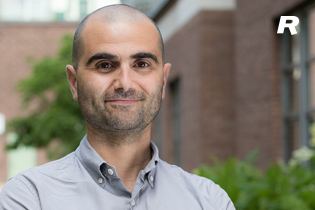 For Professor Nicola Lacetera, asking uncomfortable questions is all part of the job.
For Professor Nicola Lacetera, asking uncomfortable questions is all part of the job.
In recent years, his research has tackled serious societal topics, ranging from whether we should permit paid organ donations to understanding how countries develop legislation around surrogacy, prostitution and abortion.
Essentially, these are all economic questions, says Lacetera, who is a Professor of Strategic Management at the Rotman School of Management and at the Institute for Management and Innovation at the University of Toronto Mississauga.
“Like any economic issue, it comes down to supply and demand,” he explains.
“We have long waiting lists for organ transplants and surrogates for pregnancies, and not enough donors and volunteers. My research looks at how and whether we can increase supply — and what that would look like.”
—Nicola Lacetera, Associate Professor, Strategic Management
In sum, his research is about “understanding people’s motivations and the ethics involved when it comes to money, time and their bodies.”
The questions that Lacetera explores in his research do not have straightforward answers. Often, they raise other uncomfortable issues.
For example, when it comes to paying healthy individuals for non-essential organs, like one of their kidneys, new dilemmas arise.
“Would we be willing to take this a step further? Would we eventually consider treating kidneys as collateral for debt? And what about vital organs — like the hearts or lungs?” Lacetera wonders. “We could find ourselves on a slippery slope.”
On the other hand, not regulating paid organ donation will keep the supply low and provide opportunities for a black market to emerge, he says. And poorer, more vulnerable populations could be exploited.
Lacetera doesn’t offer up solutions. Rather, his role is to point out the tough questions we need to ask in these situations, and to design studies that explore how individuals think about these issues — and the tradeoffs involved.
His work has already had real impact. In recent years, he’s worked closely with blood donation organizations, including the American Red Cross, to investigate the effectiveness of incentive programs.
In one of his studies, he found that offering small gift cards helped to boost short-term donations. Though incentives didn’t increase (or decrease) the frequency of donations in the long term, providing small gifts could help blood banks regulate the volume of donations they receive in a given year. In fact, the American Red Cross has recently implemented an incentive campaign to encourage donations during low seasons, such as during the holidays or winter months.
Lacetera is also interested in the big picture. In a recent study, he and his co-authors mined through over 50 years of legislation and policy information to understand how countries around the world have developed such varied stances when it comes to regulating ‘morally contentious’ activities such as abortion, commercial surrogacy and prostitution.
“It’s interesting to see how developed countries vary so dramatically on these issues,” he says. “One nation might prohibit prostitution, but allow surrogacy — while in a similar or neighbouring country, they might have completely opposite views.”
Based on their preliminary analysis of data concerning over 100 countries, the researchers found that higher-income countries tended to support reproductive rights for women — but, there is still a lot of variation. And it’s worth examining these trends from philosophical, bioethical, political perspectives, too, he says.
With advances in genetic engineering, AI and other technologies, Lacetera is curious about the new dilemmas that might arise and how individuals and governments will react.
“There’s a balance that needs to be maintained between respecting the dignity of the human body and saving lives,” he says. “Embedded in all of these economic questions are ethics and values. It’ll be fascinating to see how people’s perceptions and morals evolve over time.”
Written by Rebecca Cheung | More Research Insights »